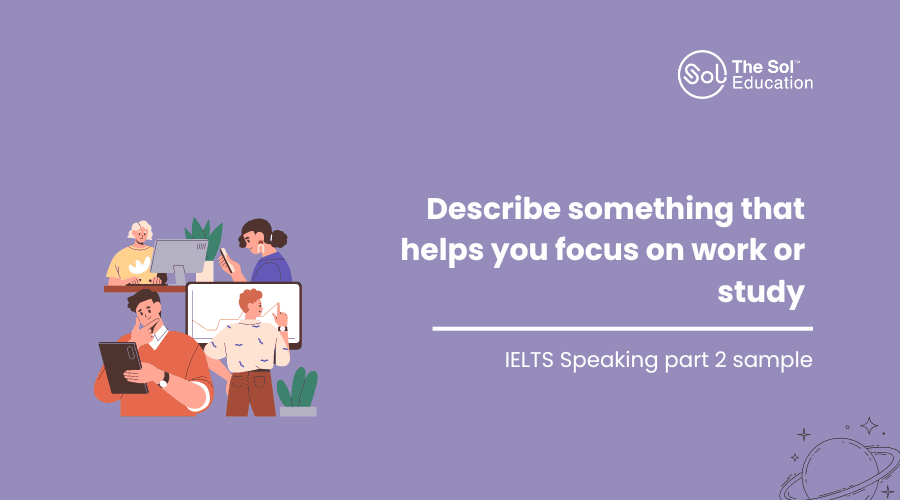Chữa đề IELTS Speaking part 2 Describe something that helps you focus on work or study và các câu hỏi IELTS Speaking part 3 liên quan cùng SOL IELTS.
Đọc thêm:
Describe something that helps you focus on work or study.
You should say:

What really helps me focus on my studies is classical music – light classical music.
I always put violin or cello music on when I am studying, or clarinet music. I don’t put it on loudly. I just put it on in the background, and I choose really calm concertos and pieces of music that are not too fast or too erratic. This helps my mind detach from the stresses and strains of daily life, and helps to make my thoughts calm and focused.
It’s a habit I’ve had for many years, which started, I think, when I was in high school, and a teacher recommended it. I began doing it in my dorm at university almost every time I had to study and I found it worked wonderfully. In those days I used to listen to music on headphones, because I shared the dorm with others, but now I have my own room. I play it on speakers from my computer. I am a person who needs to be in a quiet place when I am studying – a place where I cannot hear the sound of traffic on the roads or anything like this – so putting on calming, relaxing classical music can also help to drown out any of the sound of the city that might come in through the window.
So, yeah, this is my main method of concentrating and relaxing when I really need to focus on studies and shut out the outside world.
Từ vựng IELTS hữu ích:
Detach from (verb):[dɪˈtætʃ] - Tách rời, ly khai
Stresses and strains (noun phrase):[ˈstrɛsɪz ænd streɪnz] - Áp lực và căng thẳng
Calm and focused (adjective phrase):[kɑːm ənd ˈfoʊkəst] - Bình tĩnh và tập trung
Habit (noun):[ˈhæbɪt] - Thói quen
Concertos (noun):[kənˈʧɛrtoʊz] - Bản hòa nhạc
Erratic (adjective):[ɪˈrætɪk] - Không ổn định, thất thường
Concentrating (verb):[ˈkɒnsəntreɪtɪŋ] - Tập trung
Shut out (phrasal verb):[ʃʌt aʊt] - Loại bỏ, cô lập
Undoubtedly, the ability to concentrate is pivotal for children's academic and personal development. Concentration forms the bedrock of effective learning, enabling students to absorb information, solve problems, and engage in critical thinking. Beyond academics, cultivating concentration fosters discipline, resilience, and a strong work ethic, attributes that contribute significantly to success in various aspects of life. Therefore, it is imperative for children to learn and hone concentration skills from an early age as a foundational element for their future endeavors.
Từ vựng tham khảo:
Pivotal (adjective):[ˈpɪvətl̟] - Quan trọng, then chốt
Bedrock (noun):[ˈbɛdrɑːk] - Nền tảng, cơ sở
Effective (adjective):[ɪˈfɛktɪv] - Hiệu quả
Absorb (verb):[əbˈsɔːrb] - Hấp thụ
Critical thinking (noun phrase):[ˈkrɪtɪkl ˈθɪŋkɪŋ] - Tư duy phê phán
Cultivating (verb):[ˈkʌltɪˌveɪtɪŋ] - Nuôi dưỡng, phát triển
Foster (verb):[ˈfɒstər] - Nuôi dưỡng, thúc đẩy
Discipline (noun):[ˈdɪsəplɪn] - Kỷ luật
Resilience (noun):[rɪˈzɪliəns] - Sức bền, sự kiên trì
Work ethic (noun phrase):[wɜːrk ˈɛθɪk] - Đạo đức làm việc
Attributes (noun):[əˈtrɪbjuːts] - Đặc tính, phẩm chất
Contribute (verb):[kənˈtrɪbjut] - Đóng góp
Imperative (adjective):[ɪmˈpɛrətɪv] - Cấp bách, quan trọng
Hone (verb):[hoʊn] - Rèn luyện, làm sắc bén
Foundational element (noun phrase):[faʊnˈdeɪʃənl ˈɛləmənt] - Yếu tố cơ bản
Future endeavors (noun phrase):[ˈfjʊtʃər ɪnˈdɛvərz] - Các nỗ lực trong tương lai
Employers play a crucial role in fostering a conducive environment for employee concentration. Providing ergonomic workspaces with minimal distractions is essential. Implementing flexible work schedules or designated quiet hours can also enhance concentration. Offering training on time management and stress reduction equips employees with tools to maintain focus. Additionally, recognizing and celebrating achievements contributes to a positive work atmosphere, motivating employees to stay engaged and concentrated on their tasks.
Từ vựng tham khảo:
Crucial (adjective):[ˈkruːʃəl] - Quan trọng, quyết định
Fostering (verb):[ˈfɒstərɪŋ] - Nuôi dưỡng, thúc đẩy
Conducive (adjective):[kənˈduːsɪv] - Tạo điều kiện, thuận lợi
Ergonomic (adjective):[ˌɜːrɡəˈnɒmɪk] - Thiết kế nhằm tối ưu hóa sự thoải mái và hiệu suất
Minimal (adjective):[ˈmɪnɪməl] - Tối thiểu, ít nhất
Distractions (noun):[dɪˈstrækʃənz] - Sự xao lạc, sự phân tâm
Implementing (verb):[ˈɪmplɪˌmɛntɪŋ] - Thực hiện, triển khai
Flexible work schedules (noun phrase):[ˈflɛksəbl wɜːrk ˈʃɛdjuːlz] - Lịch trình làm việc linh hoạt
Designated (adjective):[ˈdɛzɪɡˌneɪtɪd] - Được chỉ định, được xác định trước
Time management (noun phrase):[taɪm ˈmænɪdʒmənt] - Quản lý thời gian
Stress reduction (noun phrase):[strɛs rɪˈdʌkʃən] - Giảm căng thẳng
Recognizing (verb):[ˈrɛkəɡˌnaɪzɪŋ] - Nhận ra, công nhận
Celebrating (verb):[ˈsɛləˌbreɪtɪŋ] - Tự hào, kỷ niệm
Positive work atmosphere (noun phrase):[ˈpɒzətɪv wɜːrk ˈætməsfɪr] - Bầu không khí tích cực tại nơi làm việc
Motivating (verb):[ˈmoʊtəˌveɪtɪŋ] - Động viên, thúc đẩy
Engaged (adjective):[ɪnˈɡeɪdʒd] - Tận tâm, tập trung
Jobs that demand higher concentration typically involve intricate tasks, complex problem-solving, or critical decision-making. Professions in fields such as healthcare, aviation, and finance often require intense focus due to the precision and potential consequences associated with their responsibilities. Similarly, research scientists, software developers, and creative professionals engaged in design or innovation also require sustained concentration to achieve optimal outcomes in their work.
Từ vựng IELTS tham khảo:
Demand (verb):[dɪˈmænd] - Đòi hỏi, yêu cầu
Higher concentration (noun phrase):[ˈhaɪər ˌkɒnsənˈtreɪʃən] - Tập trung cao hơn
Intricate (adjective):[ˈɪntrɪkət] - Phức tạp, rắc rối
Complex (adjective):[ˈkɒmplɛks] - Phức tạp
Problem-solving (noun):[ˈprɒbləm ˌsɒlvɪŋ] - Giải quyết vấn đề
Critical (adjective):[ˈkrɪtɪkl̟] - Quyết định, quan trọng
Decision-making (noun):[dɪˈsɪʒənˌmeɪkɪŋ] - Quyết định
Professions (noun):[prəˈfɛʃənz] - Nghề nghiệp
Aviation (noun):[ˌeɪviˈeɪʃən] - Hàng không
Finance (noun):[ˈfaɪnæns] - Tài chính
Intense focus (noun phrase):[ɪnˈtɛns ˈfoʊkəs] - Tập trung mạnh mẽ
Precision (noun):[prɪˈsɪʒən] - Độ chính xác
Potential consequences (noun phrase):[pəˈtɛnʃəl ˈkɒnsɪkwənsɪz] - Hậu quả có thể xảy ra
Research scientists (noun phrase):[rɪˈsɜːrt ˈsaɪəntɪsts] - Nhà nghiên cứu
Software developers (noun phrase):[ˈsɒftwɛər dɪˈvɛləpərz] - Nhà phát triển phần mềm
Creative professionals (noun phrase):[kriˈeɪtɪv prəˈfɛʃənlz] - Chuyên gia sáng tạo
Engaged in (verb phrase):[ɪnˈɡeɪdʒd ɪn] - Tham gia vào
Sustained concentration (noun phrase):[səˈsteɪnd ˌkɒnsənˈtreɪʃən] - Tập trung liên tục
Optimal outcomes (noun phrase):[ˈɒptɪməl ˈaʊtkʌmz] - Kết quả tốt nhất
Yes, like many individuals, there have been occasions when external factors or personal challenges made it challenging to maintain concentration. However, recognizing the importance of the task at hand and employing strategies such as time management, short breaks, and creating a conducive environment have proven effective in overcoming such difficulties and regaining focus.
Từ vựng IELTS tham khảo:
External factors (noun phrase):[ɪkˈstɜːrnl ˈfæktərz] - Yếu tố bên ngoài
Personal challenges (noun phrase):[ˈpɜːrsənl ˈʧælɪndʒɪz] - Thách thức cá nhân
Challenging (adjective):[ˈʧælɪndʒɪŋ] - Khó khăn, đầy thách thức
Maintain concentration (verb phrase):[meɪnˈteɪn ˌkɒnsənˈtreɪʃən] - Giữ tập trung
Recognizing (verb):[ˈrɛkəɡˌnaɪzɪŋ] - Nhận ra, công nhận
Strategies (noun):[ˈstrætədʒiz] - Chiến lược, phương pháp
Time management (noun phrase):[taɪm ˈmænɪdʒmənt] - Quản lý thời gian
Short breaks (noun phrase):[ʃɔːrt breɪks] - Giảm nhẹ
Conducive (adjective):[kənˈduːsɪv] - Tạo điều kiện, thuận lợi
Proven effective (adjective phrase):[ˈproʊvən ɪˈfɛktɪv] - Đã được chứng minh hiệu quả
Overcoming difficulties (noun phrase):[ˌoʊvərˈkoʊmɪŋ ˈdɪfɪkəltiz] - Vượt qua khó khăn
Regaining focus (verb phrase):[riˈɡeɪnɪŋ ˈfoʊkəs] - Lấy lại sự tập trung
In the contemporary digital age, technological distractions, such as notifications on devices and social media, can be pervasive. Balancing work responsibilities with personal commitments sometimes poses a challenge. However, implementing time management techniques, setting priorities, and creating designated focus periods have been instrumental in mitigating these distractions and enhancing overall concentration.
Từ vựng IELTS tham khảo:
Technological distractions (noun phrase):[ˌtɛknəˈlɒdʒɪkəl dɪsˈtrækʃənz] - Sự làm phân tâm của công nghệ
Notifications (noun):[ˌnoʊtɪfɪˈkeɪʃənz] - Thông báo
Pervasive (adjective):[pərˈveɪsɪv] - Lan tràn, phổ biến
Work responsibilities (noun phrase):[wɜːrk rɪˌspɒnsəˈbɪlɪtiz] - Trách nhiệm công việc
Personal commitments (noun phrase):[ˈpɜːrsənl kəˈmɪtmənts] - Cam kết cá nhân
Poses a challenge (phrase):[ˈpoʊz ə ˈʧælɪndʒ] - Đặt ra thách thức
Implementing (verb):[ˈɪmplɪˌmɛntɪŋ] - Thực hiện, triển khai
Time management techniques (noun phrase):[taɪm ˈmænɪdʒmənt ˈtɛkniks] - Kỹ thuật quản lý thời gian
Setting priorities (verb phrase):[ˈsɛtɪŋ praɪˈɔrətiz] - Đặt ưu tiên
Mitigating (verb):[ˈmɪtɪˌɡeɪtɪŋ] - Giảm nhẹ, làm dịu đi
Designated focus periods (noun phrase):[ˈdɛzɪɡˌneɪtɪd ˈfoʊkəs ˈpɪəriədz] - Chu kỳ tập trung được chỉ định
Instrumental (adjective):[ˌɪnstrəˈmɛntəl] - Có vai trò quan trọng
